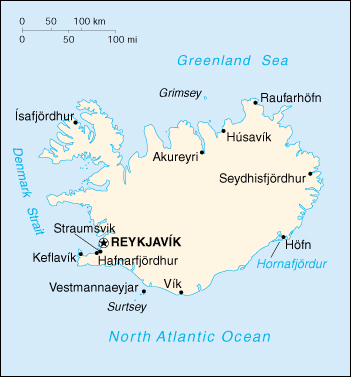
Lyoveldio Island
(Republic of Iceland)
Settled by Norwegian and Celtic (Scottish and Irish) immigrants during the late 9th and 10th centuries A.D., Iceland boasts the world's oldest functioning legislative assembly, the Althing, established in 930.
Independent for over 300 years, Iceland was subsequently ruled by Norway and Denmark. Limited home rule from Denmark was granted in 1874 and complete independence attained in 1944.
Chief of state is President Olafur Ragnar Grimsson (since 1 August 1996); ran unopposed in 2000 and was re-elected. Prime Minister is David Oddsson (since 30 April 1991).
Captial of Iceland is Reykjavik, and Independence Day, 17 June (1944, from Denmark) is the National holiday.

|
Location: Northern Europe, island between the Greenland Sea and the North Atlantic Ocean, northwest of the UK.
The area is approximately 103,000 sq km (100,250 sq km land. 2,750 sq km water). Terrain is mostly plateau interspersed with mountain peaks, and icefields. The coast is deeply indented by bays and fjords. Natural hazards include earthquakes and volcanic activity. Climate is temperate; moderated by North Atlantic Current. You will find mild, windy winters, and damp, cool summers.
Population: About 280,798 people live in Iceland.
The ethnic group is a homogeneous mixture of descendants of Norse and Celts. Languages include Icelandic, English, Nordic, and German.
Religious Denomination: Evangelical Lutheran (93%). Other Protestant, Roman Catholic, and none (7%).
Agriculture: Products include potatoes, and turnips.
Also, cattle, sheep, and fish.
Economy: Iceland's Scandinavian-type economy is basically capitalistic, yet with an extensive welfare system, low unemployment, and remarkably even distribution of income. In the absence of other natural resources (except for abundant hydrothermal and geothermal power), the economy depends heavily on the fishing industry, which provides 70% of export earnings and employs 12% of the work force. The government remains opposed to EU membership, primarily because of Icelanders' concern about losing control over their fishing resources. Iceland's economy has been diversifying into manufacturing and service industries in the last decade, and new developments in software production, biotechnology, and financial services are taking place. The tourism sector is also expanding, with the recent trends in ecotourism and whale watching. Growth has been remarkably steady over the past five years at 4%-5%.
Currency: Icelandic krona (ISK).

